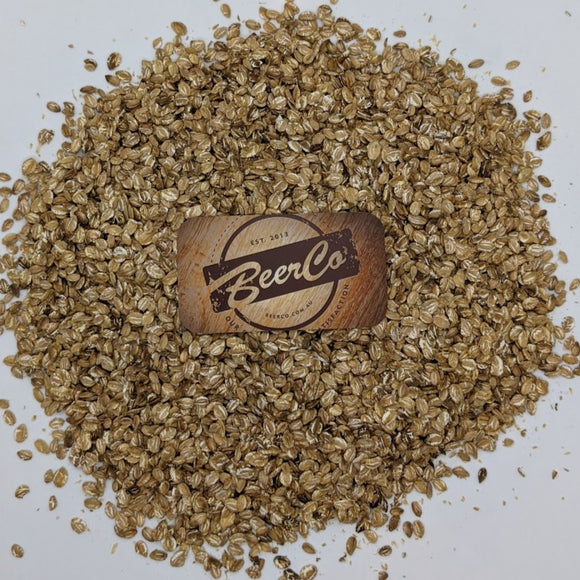Blue Lake Milling Rolled Rye is traditionally dehulled rye, which is then steamed and rolled into flat flakes under heavy rollers. The rye shall be fresh, sound and free from signs of pest infestation and rodent contamination. The quality of rye should comply with all relevant food standards and regulations.
Blue Lake Milling Flaked Rye has been produced specifically for brewing, developing characteristics necessary for easy and efficient use in a brewhouse. The process of gelatinizing makes the starches readily soluble and digestible by the naturally occurring enzymes in barley malt. This allows the flakes to be incorporated directly into the mash with other grains.
- Because Blue Lake Rolled Rye has a large surface area and are pre-cooked, they hydrate and disintegrate quickly. Filtration time will be normal.
- There is no need to mill Rolled Rye Flakes. However, they can be put through the mill if that is the easiest means of adding them to the mash.
- Blue Lake Milling Rolled Rye Flakes are made from choice rye that is fresh, sound and free from signs of pest infestation and rodent contamination. The quality of rye should comply with all relevant food standards and regulations.
- Rolled Rye Flakes contribute a very clean distinctive rye flavour.
Product of Australia. Australian Grown and Locally Milled by Blue Lake Milling.
Typical Use:
Start at 5-10% and increase in increments of 5% because of the concentrated flavor
Rye adds a distinctive character to beer, often described as crisp, refreshing, slightly spicy and subtle. Its primary downfall is its reputation for causing stuck mashes.
One important factor to consider is rye’s high β-glucan content. β-Glucans — starches made up of long strands of glucose molecules — greatly increase wort viscosity. A slow runoff and sparge time can be expected; given rye’s high β-glucan and protein profile, filtration problems and a set mash are typical problems.
When brewing with rye, it is a good idea to keep the following hints in mind:
One important factor to consider is rye’s high β-glucan content. β-Glucans — starches made up of long strands of glucose molecules — greatly increase wort viscosity. A slow runoff and sparge time can be expected; given rye’s high β-glucan and protein profile, filtration problems and a set mash are typical problems.
When brewing with rye, it is a good idea to keep the following hints in mind:
- Increase the mash temperature 1–2 degrees to increase the runoff (note: increasing the temperature too much creates off flavors, so care is required)
- Add extra water to the mash, as needed, to keep it as thin as possible
- Give the mash a good beta glucan rest
- A simple one-step infusion is best, especially if you use a lot of rye in your recipe
- Use good equipment
- Avoid combining rye with raw barley; raw barley also has high levels of β-glucans, and this could make for an extremely sticky combination.
Typical Usage Rate:
- Use up to 40% as a cereal adjunct in the total grist to create Rye Beer.
- Start at 5-10% and increase in increments of 5% because of the concentrated flavor of Rolled Rye Flakes.
Complementary Malts:
Pack Options:
- 1 Kg Bag
- 5 Kg Bag (Save 20% on 1 Kg Price)
- 25 Kg Bag (Save 35% on 1 Kg Price)
Batch Analysis:
Typical Specification:
CHEMICAL PROPERTIES:
Shelf Life:
- At least one year when stored properly in dry conditions.
Craft Beer Examples:
BeerCo Recipe Kits:
Blue Lake Milling:
100% Australian. Established in 1973, Blue Lake Milling is a leading manufacturer of premium Australian Oat and Grain products. Blue Lake Milling is committed to producing sustainable cereal products with minimal impact to the environment and our surroundings. Blue Lake Milling operations are licensed by the relevant Environmental Agency in the respective state.


